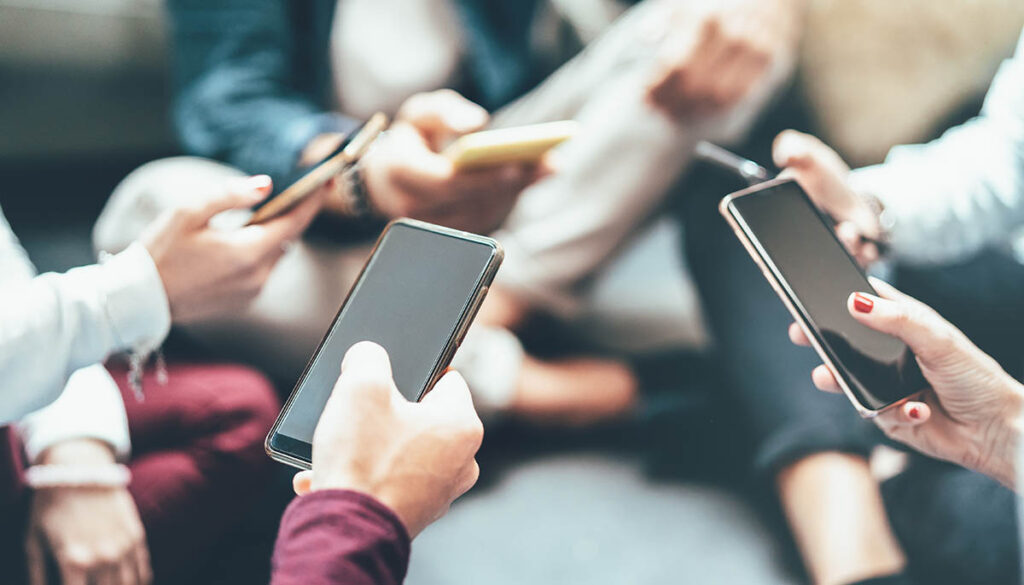It sounds like something out of a legend: a magic window that can show you anything your heart desires.
The reality is both more fantastical and more mundane. Smartphones, for better or worse, are part of our everyday lives. Using invisible signals that travel through the air around us, we can watch our favorite shows, see what’s happening all over the world, communicate with our loved ones, and build a sense of community.

Unfortunately, too much of a good thing has led many of us to become addicted to our phones. Do you think your phone use is out of control? Read on to find out if it is and get tips on how to curb your addiction for good.
How Much Is Too Much?
Cell phone addiction might not be officially recognized as a disorder (yet, anyway), but if your phone use interferes with your daily life or negatively impacts your mental health, then that’s a problem. Here are a few examples to help you figure out if you could be addicted to your phone:
- You feel anxious without your phone nearby or worry that you might be missing out on something important.
- You neglect in-person conversations in favor of staring at your phone.
- You spend a lot of time thinking about how to get more likes and followers or dwelling on social media drama.
- Your smartphone social interactions leave you feeling upset or depressed.
- You reach for your phone automatically throughout the day or think you hear an alert even when it is silent.
- You experience headaches, eyestrain, or repetitive motion injuries from using your phone.
The Psychological Reason Why You Can’t Put Down Your Phone
Have you heard of operant conditioning? In a very small nutshell, it’s a type of behavior modification that trains our brains using rewards and punishment. When we do the desirable thing, we get a treat. When we do the undesirable thing, we get punished. And from Facebook’s perspective, the undesirable thing is to spend less time on Facebook.
Without us fully realizing it, mobile technology–and especially social media–has trained us to respond in certain ways. Hear a chime on your phone, check your messages, get rewarded with a text from a friend. Rinse and repeat.

In the mid 20th century, B.F. Skinner pioneered the study of operant conditioning. And he discovered something surprising. While it makes a certain amount of sense that we could train rats or pigeons (or people) to respond to stimuli using rewards and punishment, Skinner discovered that random, unpredictable rewards caused an even greater response in his test subjects. So strong was the desire to pursue these random rewards that the animals would compulsively seek them out.
Sound uncomfortably familiar? It’s the principle behind loot boxes in mobile games. You pay a certain amount of money to get a set of random rewards. You could buy one box and get the biggest, rarest reward, or you could buy six boxes and still never obtain it. Social media provides variable rewards, too, with degrees of instant gratification for how many likes or comments you get.
This type of conditioning is so powerful that it’s almost impossible to resist through willpower alone. It is hardwired into the reward center of your brain, which craves novelty and stimulation above all things. Every time you clear all the candies or get a reaction on your Instagram post, you get a little hit of dopamine. The low dose of feel-good chemicals is just enough to keep us engaged and seeking more stimulation.
That’s how you can end up scrolling for hours without fully realizing what you are doing. The good news is that once you are aware of what’s happening, you can take steps to shut down the “desire engine” that fuels your compulsive behavior.

First, Don’t Throw Out Your Phone
Let’s be clear about one thing. I am not encouraging you to throw out your phone. In fact, there’s a very good chance you are reading this on a smartphone right now, and think of all the great HeyPumpkin stories you’d miss if you chucked your phone in the river!
The key, as with everything else in life, is moderation. It isn’t practical to go phoneless in modern Western society. I considered getting rid of mine, but then I started to think about all the things I’d need to buy to replace the functions of my phone: an alarm clock, a stereo, a GPS device, an eReader…
So if smashing our phones with hammers and running off to live in the woods isn’t a workable solution, how do we live a more connected, fulfilling life without sacrificing the good stuff that smartphones provide?
How to Curb Your Phone Addiction
There are a few easy ways to cut back on your phone use without becoming a total hermit. If you’re concerned about using social media too often, you could delete the apps from your phone so that it takes just a little more effort to access those sites. You could also put a timer on your phone so that you can only scroll for five or ten minutes before getting a reminder to quit.

If you’re in the habit of using your phone in bed–thereby bombarding your eyes with light and throwing off your circadian rhythm–leave it in another room! Sleep hygiene is vital to getting a good night’s rest, so try building a new habit where you put your phone in a drawer instead of curling up with it like a teddy bear. If your phone doubles as your alarm clock, you can replace it with a traditional clock or opt for a smart home speaker that will wake you up without tempting you with a screen.
You can also turn off notifications for all but your most essential apps or set quiet hours where you won’t be disturbed. It’s a small thing, but taking back control of how often your phone is allowed to grab your attention can make a huge difference.
Don’t forget that your smartphone exists to serve you–not the other way around!













